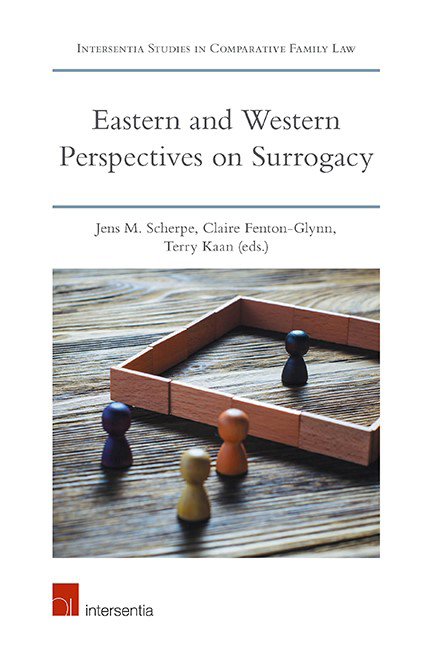Book contents
- Frontmatter
- Preface and Acknowledgements
- Contents
- List of Contributors
- Introduction
- Questionnaire
- PART I WESTERN PERSPECTIVES
- THE PROHIBITIVE APPROACH
- THE TOLERANT APPROACH
- THE REGULATORY APPROACH
- THE FREE MARKET APPROACH
- THE INFLUENCE OF INTERNATIONAL COURTS
- PART II EASTERN PERSPECTIVES
- THE PROHIBITIVE APPROACH
- A TOLERANT APPROACH?
- REGULATION THROUGH PROFESSIONAL MEDICAL BODIES
- FROM FREE MARKET TO REGULATION
- PART III COMPARATIVE PERSPECTIVES ON SURROGACY
- Surrogacy in a Globalised World: Comparative Analysis and Thoughts on Regulation
- Index
- About the Editors
Surrogacy in a Globalised World: Comparative Analysis and Thoughts on Regulation
from PART III - COMPARATIVE PERSPECTIVES ON SURROGACY
Published online by Cambridge University Press: 26 June 2019
- Frontmatter
- Preface and Acknowledgements
- Contents
- List of Contributors
- Introduction
- Questionnaire
- PART I WESTERN PERSPECTIVES
- THE PROHIBITIVE APPROACH
- THE TOLERANT APPROACH
- THE REGULATORY APPROACH
- THE FREE MARKET APPROACH
- THE INFLUENCE OF INTERNATIONAL COURTS
- PART II EASTERN PERSPECTIVES
- THE PROHIBITIVE APPROACH
- A TOLERANT APPROACH?
- REGULATION THROUGH PROFESSIONAL MEDICAL BODIES
- FROM FREE MARKET TO REGULATION
- PART III COMPARATIVE PERSPECTIVES ON SURROGACY
- Surrogacy in a Globalised World: Comparative Analysis and Thoughts on Regulation
- Index
- About the Editors
Summary
What was said in the introduction to this volume remains valid, as transpires very clearly from every preceding chapter of this volume: the issues arising out of surrogacy are global ones. As the contributions in this book show, there is a huge disparity in the way different jurisdictions deal (or indeed do not deal) with surrogacy. The aim of this final chapter is to examine the different aspects of regulation present in the 21 Eastern and Western jurisdictions discussed in this volume. Sections 1 to 7 therefore first provide a comparison and overview of the features of the various legal frameworks (or lack thereof), identifying similarities and trends. The concluding Section 8 then undertakes a critical analysis of the current state of the law of surrogacy throughout both Eastern and Western jurisdictions, and in doing so addresses the strengths and weaknesses of the current approaches.
Given the vastly different social, ethical, political, cultural, traditional and legal views on surrogacy, it would be highly inappropriate (to say the very least) to draft firm recommendations or concrete conclusions on what every jurisdiction ought to do, as this would inevitably be coloured by the authors ‘own views, which by necessity are embedded in their own social and legal cultures. Thus the aim of this chapter is not to prescribe adherence to any one framework, but to point out issues that will inevitably have to be dealt with or addressed, and show how other jurisdictions have done this. That said, the chapter concludes by identifying five key features that must define any legal framework for surrogacy and therefore must be considered by any jurisdiction, irrespective of which approach ultimately is taken.
GENERAL LEGAL FRAMEWORK
STRUCTURE OF THE REGIME
The jurisdictions canvassed in this book can be divided into five main categories: prohibitive; tolerant; regulatory; free market; and regulation by the medical profession. While there will of course be some systems that will blur the boundaries between these categories, they hopefully serve to show the different approaches taken by the legislature (or not taken, as the case may be), and how the vastly differing starting positions may affect the ability of the international community to come to a consensus concerning cross-border surrogacy.
- Type
- Chapter
- Information
- Eastern and Western Perspectives on Surrogacy , pp. 515 - 592Publisher: IntersentiaPrint publication year: 2019
- 2
- Cited by



